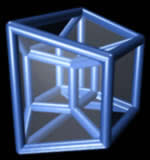Hypercubes
In Geometry we can have different dimensions.
The general idea of a cube in any dimension is called a hypercube, or n-cube.
A 0-cube is a point, a 1-cube is a line,
a 2-cube is a square, a 3-cube is a cube, etc
Points, Lines, Surfaces, ...
The magic binomial x+2 can tell us how many points, lines, surfaces etc for each dimension:
(x+2)0 = 1
For zero dimensions we have 1 point
(x+2)1 = x + 2
We have x (a line of length "x") and 2 points(x+2)2 = (x+2)(x+2) = x2 + 4x + 4
We have x2 (representing the area), 4 lines each of length x, and 4 points
(x+2)3 = (x+2)(x2 + 4x + 4) = x3 + 6x2 + 12x + 8
We have an x3 (the volume), 6 surfaces, 12 lines and 8 points.
Verify it for yourself ... how many faces are there on a cube? How many lines, how many points?

But we can go further ... into higher dimensions!
A Tesseract is the 4D version of a cube: a 4-cube.
(x+2)4 = (x+2)(x3 + 6x2 + 12x + 8) = x4 + 8x3 + 24x2 + 32x + 16
So a 4-cube has:
- 1 4D space
- 8 cubes
- 24 surfaces
- 32 lines
- 16 points
We may have trouble imagining what it looks like, but we can know its facts!
How on Earth does this Work?
It is pure magic of course!
And also: x+2 describes a line with two points.
Maybe if we get more general it would help?
More General
Let us step away from pure cubes and allow different sizes:
(x+2)1 = x + 2
We have a line of length "x" and 2 points(x+2)(y+2) = xy + 2x + 2y+ 4
We have a rectangle of area xy, with 2 lines of x, 2 lines of y, and 4 points
(x+2)(y+2)(z+2) = xyz + 2xy + 2yz + 2xz + 4x + 4y + 4z + 8
We have a cuboid with volume of xyz, 2 surfaces each of xy, yz and xz, 4 lines each of x, y and z, and 8 points.

I will leave the next dimension for you to figure out.